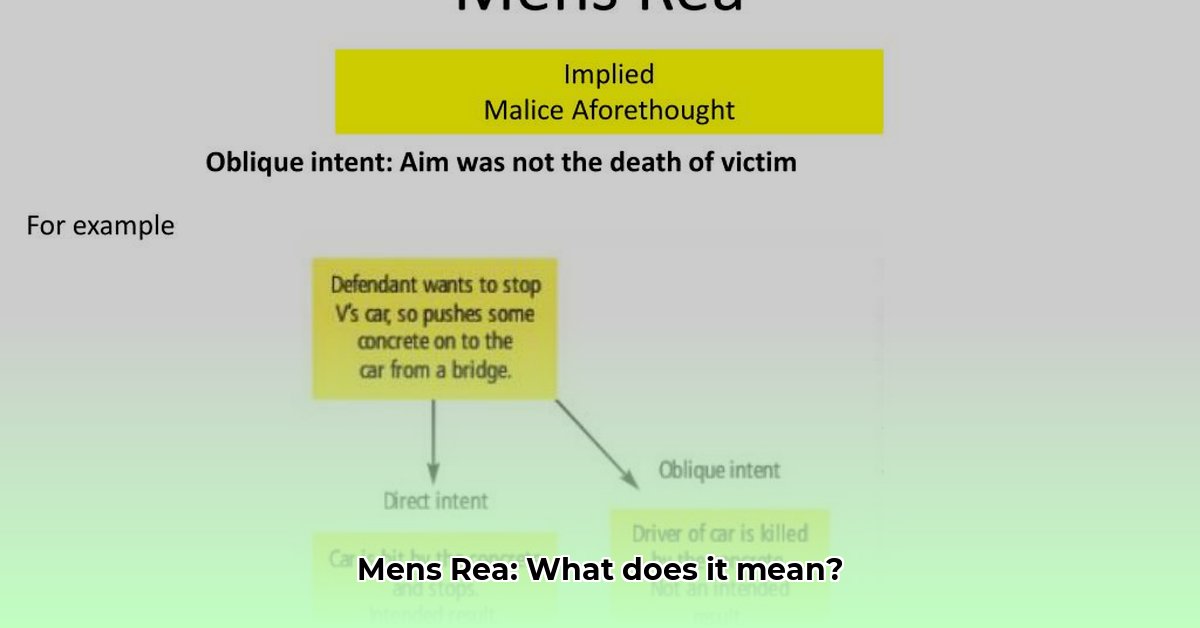INTENT
This clue appeared in the NYT Crossword on either June 20 or 21, 2024, according to various sources.
What is Mens Rea?
Mens rea is a legal term referring to the mental state required to commit a crime, often translated as “guilty mind.” It’s the element of criminal responsibility that addresses the defendant’s awareness of the fact that their conduct is criminal.
Why is “Intent” an Example of Mens Rea?
Intent signifies a purposeful action, fulfilling the “guilty mind” requirement. If someone acts with intent, they are acting deliberately, with the aim of achieving a specific criminal outcome. This conscious decision to commit a crime makes intent a clear example of mens rea.
Other Examples of Mens Rea
While intent is a common and crucial element of mens rea, it isn’t the only one. Other examples, which often involve varying degrees of culpability, include:
- Recklessness: This involves consciously disregarding a substantial and unjustifiable risk. The defendant knows their actions might cause harm, but they proceed anyway.
- Negligence: Involves failing to exercise the level of care a reasonable person would in similar circumstances. The focus here isn’t on what the defendant knew, but on what they should have known.
- Knowledge: This refers to knowing certain facts that make an act criminal, even without necessarily intending the specific outcome. For instance, knowingly selling counterfeit goods, even without the express intent to defraud buyers, still involves mens rea.
- Willful Blindness: This involves deliberately avoiding learning the truth about a situation, even when there’s a strong suspicion of illegality. This suggests an active choice to remain ignorant, which is often a component of a culpable mindset.
Exploring the Nuances of Mens Rea
Mens rea is more than a simple checklist of mental states. It’s a complex concept that grapples with questions of culpability, justice, and how we determine responsibility for criminal actions.
The Spectrum of Culpability
The different types of mens rea often represent gradations of culpability. Intent typically signifies a higher degree of guilt than negligence, for example, as it suggests a deliberate choice to commit a wrong. This spectrum of culpability plays a significant role in determining appropriate punishments. Premeditated murder, which involves clear intent, carries a much harsher penalty than manslaughter resulting from negligence, even though both result in the loss of life.
Proving Mens Rea – The Challenge of Entering the Mind
Establishing mens rea can be one of the most challenging aspects of a criminal case. Unlike physical evidence, proving someone’s mental state often relies on circumstantial evidence, interpretations of behavior, and inferences based on the surrounding facts. Did the defendant confess? Did they flee the scene? What were their actions leading up to the crime? These are the types of questions investigators and lawyers consider when attempting to determine mens rea.
The Evolving Nature of Mens Rea
Our understanding of mens rea isn’t static. Ongoing research in fields like psychology and neuroscience continues to shed light on how the human mind works, influencing our understanding of intent, decision-making, and the nature of criminal responsibility. These evolving insights suggest that our current understanding of mens rea is likely not the final word, and the topic will likely continue to be a subject of legal and philosophical debate.
Mens Rea in the Modern World
As society and technology change, so do the types of crimes we encounter. Cybercrime, for example, presents new challenges for applying traditional concepts of mens rea. How do we define and prove intent in the digital realm, where actions can be taken remotely and anonymously? These are among the many questions that legal scholars are currently grappling with as they seek to adapt traditional legal principles to a rapidly changing world.
While a seemingly simple crossword clue, “mens rea, for example,” opens a window into a fascinating and crucial element of criminal law. It reminds us that justice is about more than just actions; it’s also about the mental states behind those actions, and the complex challenge of understanding the “guilty mind.”
- How to Stop Apps From Running in the Background to Boost Your - December 1, 2025
- How To Move Apps On Your Droid For Better Organization - November 30, 2025
- How to Move Apps on Android for Better Organization - November 29, 2025










